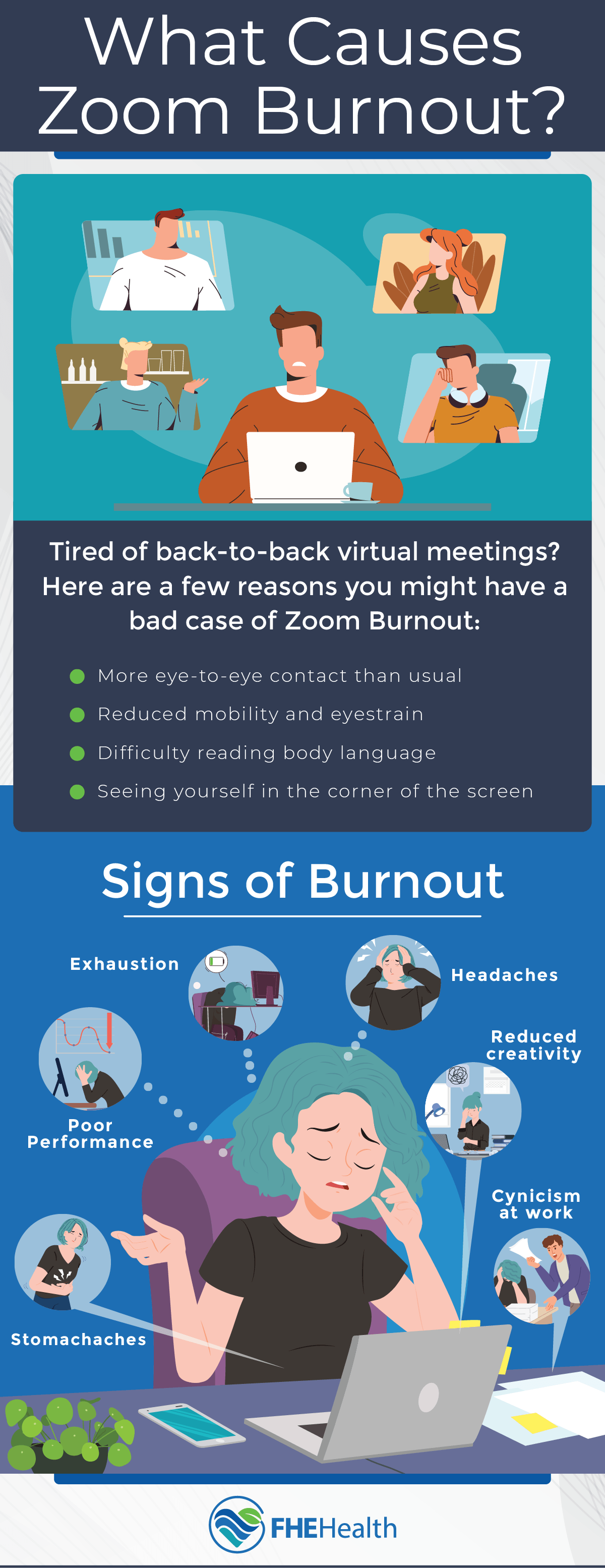
See our research survey on Working From Home and Mental Health
Working from home offers numerous benefits. It eliminates lengthy commutes and provides scheduling flexibility for making appointments. Remote work has seemingly made it easier to develop a healthy work-life balance. However, many remote employees experience work-from-home burnout, especially when they struggle to separate their jobs from their personal lives. Explore common causes of remote work burnout and how to better manage stress and exhaustion to build a more fulfilling, productive lifestyle.
Identifying Work-From-Home Burnout: What It Is and Common Causes
Working from home became prevalent during the COVID-19 pandemic, and it’s remained popular with workers ever since. According to the Pew Research Center, about 35% of workers with access to remote jobs choose to work from home all the time. Remote work may offer freedoms such as choosing when and where you work, but it doesn’t exempt employees from burnout.
In fact, work-from-home burnout has increased. One study reveals 86% of workers report experiencing high levels of remote work exhaustion, and 38% report suffering from burnout due to feeling pressured by management to work more hours.
Burnout refers to a state of mental, physical and emotional exhaustion. It can adversely affect your physical and mental health, resulting in various conditions, including:
- Depression
- Anxiety
- High blood pressure
- Weakened immune system
- Heart disease
- Obesity
- Cognitive decline
- Inability to cope with stress
Workplace burnout can happen to an employee in any job who isn’t getting adequate rest or breaks. You may feel overly stressed and frustrated or uninterested in your work. Burnout can also make it difficult to concentrate, interact with coworkers and brainstorm creative ideas. Additionally, it can result in physical or behavioral symptoms, including lashing out, feeling fatigued and crying under inappropriate circumstances.
Common Causes of Work-From-Home Burnout
Several factors can contribute to remote work burnout. One of the most common causes is feeling unable to disconnect from your job. Technology and digital communication have made it easier for employers to connect with workers, putting pressure on employees to work harder and longer. This has caused employees to check emails or finish reports during their personal time, resulting in seemingly endless work days.
Additionally, some workers experience burnout from trying to manage their work and home lives simultaneously, especially if they have young children to care for. Going straight from working to dealing with family demands can make it challenging to find time to relax or decompress.
Remote work can also be isolating. Not having to deal with office distractions or talkative coworkers randomly dropping by your desk has its perks. However, coworkers can also provide a safe space to vent about work-related stress or seek advice if a problem occurs. Lacking that supportive environment can increase the risk of burnout.

Strategies for Coping With Remote Work Stress
Addressing telecommuting burnout is the first step in fostering a more positive, productive lifestyle. It’s also important to develop healthy coping methods to prevent and manage burnout or stress. Consider the following strategies to maintain your well-being.
Reward Yourself
If you’re lacking motivation to complete your work, break tasks down into smaller, more manageable steps and reward yourself as you go. Rewards can vary based on each task’s complexity and include:
- Physically checking the task off your to-do list
- Taking a 10- or 15-minute break
- Checking social media
- Taking a few minutes to stretch or engage in physical exercise
- Having a favorite snack
Connect With Friends
Make an effort to connect with friends to maintain a supportive social network and avoid feeling isolated. Since everyone has busy schedules, establish a time in advance for a virtual call or an in-person lunch or happy hour. If you have a group of friends, consider creating a group chat to stay in touch and vent to each other throughout the week.
Practice Self-Care
Integrate self-care activities into your schedule that bring you comfort and happiness. This gives you something to look forward to after a long, stressful day. Examples of self-care activities include:
- Practicing yoga or meditation
- Walking or running
- Reading
- Listening to music or a podcast
- Drawing or painting
- Cooking
- Watching TV
How to Establish Boundaries to Maintain a Work-Life Balance
Maintaining a healthy work-life balance is crucial in preventing burnout. This can be difficult to do, but establishing strong boundaries between your work and home lives can help. Here are some tips to consider.
Develop a Routine
Developing a routine can help you establish set working hours and better manage your time. Maintain consistent times for starting and ending your work day. It can also be helpful to schedule regular lunch hours and breaks to ensure you’re taking time to unplug and tend to your needs.
Create a Dedicated Workspace
It may be tempting to work from the couch or bed, but this can blur the lines between work and personal time. Establish a workspace dedicated solely to job-related tasks, whether it’s a home office or a small corner of the living room. This allows you to shift your focus from work to home as you enter different spaces in your house.
Minimize Distractions
When you start your work day, consider silencing your phone or turning off notifications. This prevents loved ones or apps from causing distractions. If you have the means, ask or hire someone to watch your children or take your dog for a walk while you’re working. This alleviates having to divide your attention between work and home responsibilities.
Don’t Be Afraid to Say No
If your job or family is demanding too much of you, don’t be afraid to turn down requests. Communicate your dedicated working hours so they know when you’re available. Trying to balance everything at once can reduce your overall productivity and quality of work, increasing your risk of feeling stressed, burned out or unmotivated.
Take a Proactive Approach to Managing Your Mental Well-Being
Ultimately, prioritizing your mental health and well-being can help you prevent and manage work-from-home burnout. If you’re experiencing prolonged burnout or mental health issues, such as anxiety or depression, consider seeking professional help.
FHE Health offers a range of mental health services, therapies and programs to help individuals improve their circumstances. Contact us today to learn more about our offerings and build a healthier lifestyle.






